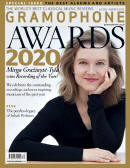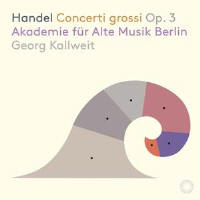Texte paru dans: / Appeared in: |
|
|
Outil de traduction (Très approximatif) |
|
|
Reviewer: Mark Seow The Akademie für Alte Musik Berlin, here under the directorship of Georg Kallweit, return in full vigour in this follow-up to the two-part Op 6 collection with Bernhard Forck (10/19, 4/20). The Op 3 set, initially published in 1734 seemingly without Handel’s knowledge, is approached with such freshness and lightness of touch that one might expect Handel’s ink to be still wet on the page. The Concerto grosso No 4 in F, HWV315, is deserving of explicit praise. The first movement, a French overture lifted from Handel’s 1715 opera Amadigi di Gaula, bounds with vivacity. Wonderfully laissez-faire playing from the continuo team (including gleefully prominent bassoon-playing) turbocharges the fugue with relentless dynamism. The returning Lentamente is particularly well navigated: with collective breath, the entire orchestra turn now to yearning; once frenzied with direction, the scalic tirades melt into song that looks to the nostalgia-threaded oboe arioso in the following movement. I’m not particularly taken by the moments of opulent harpsichord in the final minuets but this fails to detract from the loveliness on offer, namely the pair of bassoons played by Györgyi Farkas and Karin Gemeinhardt, which might well be mistaken in their lusciousness for a small double-reed choir. Absolutely triumphant is the Concerto No 2 in B flat, HWV313. The Akademie achieve an excellent transparency of texture while creating a full and bustling tutti sound. The listener is located almost as if among the musical material bounced across the orchestra, fixed in enthralment by the tantalising closeness of this sonic game of tennis. Then the chilling, swimming mystery of the Largo: the delicate, barely perceptible fretwork of lutenist Michael Freimuth that rises like morning mist from the undulating solo cellos to the unfurling serenity of the oboe. The sharing of cadential elaborations between the treble and bass soloists is a lovely touch. It confirms the dynamic and exploratory spirit of chamber music-making that suffuses each track on an album that is sure to rouse even the most weary of listeners. |
|




